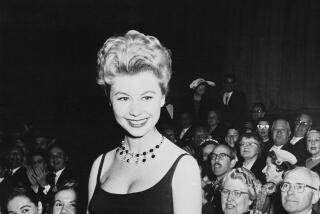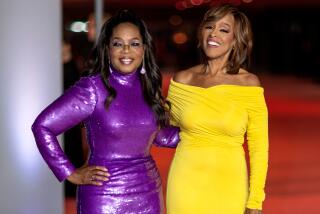The Influences on Our Taste : OPRAH WINFREY : On the Tightrope of Good Taste
- Share via
CHICAGO — This is Calendar’s third annual listing of Taste Makers, individuals who have brought a distinct focus to 1987 and who we feel will continue to influence the world of arts and entertainment long after this year passes. They were selected not so much for specific contributions in their respective fields but because they are clearly creative forces who move and shape taste. They were interviewed to find out what kinds of influences have moved and shaped them.
We’ve selected these eight individuals to reflect a broad range of creative work, though each year we try to vary the disciplines. For instance, in 1985 we interviewed architect Arata Isozaki, composer Philip Glass and restaurateur Alice Waters, among others. Last December, the group included choreographer Mark Morris, jazz musician Wynton Marsalis and Vanity Fair editor Tina Brown.
What follows, we hope, is a look at the thinking behind some of this year’s brightest creators and commentators . . . 1987’s Taste Makers.
This project was edited by David Fox, assistant Calendar editor.
Nosy, fearless and always armed with the right question, Winfrey stole Phil Donahue’s ratings crown and made Forbes’ Top 40 Wealthiest Entertainers list. When Winfrey tackles a topic, America tunes in.
Wearing a blue, jungle-print blouse and a black skirt (“a size too big, thank you very much”), Oprah Winfrey is cutting promo spots at the WLS-TV studios here after finishing another installment of “The Oprah Winfrey Show,” the program that’s brought the sizzle of supermarket tabloids to daytime TV.
The day’s topic: sex addicts. For the past hour, Winfrey sat under a bank of hot lights quizzing a parade of women (and several men) who appear to have leaped straight out of the pages of the National Enquirer.
A newlywed has been spending her Saturdays trolling for men at Marshall Fields, taking them to a nearby hotel for sex. Another guest volunteers that she finally gave in to her husband’s demands for attention, having sex 28 times in four days. A teen-ager phones in from her home, claiming she has skipped school and is waiting to have sex with several visiting classmates.
After taping a plug for an upcoming show (“Are you raising a brat? Next--on ‘The Oprah Winfrey Show’ ”) Winfrey slyly speculates about the expected reaction to the morning’s program. “Well, we know the affiliate in Salt Lake City won’t be airing that show,” she jokes. “I just can see people everywhere pulling out the stationary and the pens right now.”
Oprah mimics a slow, Midwestern drawl. “Dear Oprah, Your show on sex addicts sunk to a new low. I used to be a fan and considered you a woman of dignity. I no longer hold you in such esteem, especially after publicizing a woman who. . . .”
Oprah shrugs. “We walked the tightrope of good taste today--and I almost fell off a couple of times.” She laughs, rocking her chair side to side. “I mean, really fell off.”
At 33, Winfrey has been a TV personality for nearly half her life; her first local anchor job was in Nashville at age 19. Since then, she’s dethroned TV daytime rival Phil Donahue, gone national with her Chicago-based talk show (one of the largest grossing programs in the history of first-run syndication), co-starred in “The Color Purple” and become such a hometown heroine that when she popped up in the audience at a Lionel Richie concert here she got a thunderous, minute-long standing ovation.
And guess who’s shaped much of Winfrey’s style--TV interviewer Barbara Walters. “She was a real mentor,” Winfrey says, sipping tea in her Harpo Prods. offices here. “For the first six months I was on the air, I imitated her like crazy. I’d be incredibly nervous interviewing her now. To have her sit in my home--I’d be worried that my lamps weren’t good enough!”
Like Walters, Winfrey is a savvy interviewer with boundless curiosity, a fascination with intimate details and an almost maternal affection for plucky underdogs who’ve survived terrible calamities. These traumatic sessions aren’t just cathartic for her guests, they seem to provide an emotional release for Winfrey too.
But what makes Winfrey such a huge influence on millions of housewives and other daytime TV regulars isn’t just her impassioned, hand-holding interviewing style. It’s her show’s three-ring circus format, which offers fuel-injected blasts of controversy, celebrity stargazing and cheap thrills.
Want to see children whose parents have been murdered? The widows and family members of the dead Challenger astronauts? Honeymoon disasters? Blackmail? Psychic powers? POWs and MIAs? The KKK? Fatal attractions? Tune in “The Oprah Winfrey Show.”
And what does Winfrey think: Is she really exploring people’s psyches or just exploiting a never-ending procession of celebrities and freaks? When a teen-age girl reveals that her stepfather first murdered her mother, then stabbed himself to death the next day--should Winfrey really have asked, “Did that make you feel better or worse?”
“I say it’s OK to titillate if in the process you help someone,” she answers. “My show is really a ministry, a ministry that doesn’t ask for money. I can’t tell you how many lives we’ve changed--or inspired to change.” Winfrey taps her chest. “My style is empathetic, not accusatory. I want my audience to understand why people feel these ways, not to judge them. Maybe these sex confessions seem bizarre to you, but they’re not bizarre to someone who’s lived through them. And if sex is a concern for lots of people, then let’s do a show on it--and find a way to do it in good taste.”
And when it comes to taste--who’s influenced Winfrey the most? She cites her grandmother, who taught her to read (“Books were my way out of oppression and poverty”) and her father, who was a strong disciplinarian (“He let me know my limits”).
But at age 10, a new inspiring voice reached her ears. “I’ll never forget watching Sidney Poitier on TV when he won the Oscar for ‘Lilies of the Field,’ ” Winfrey says. “I remember his acceptance speech--and the clips they showed--like it was yesterday. I was moved because he was black and he had done it. Something in my spirit clicked. I carried that sense of accomplishment and recognition in my heart for years.”
Oddly enough, if you ask Winfrey who’s had the most impact on her in recent months, she’ll give the same answer. “I finally met Sidney recently and we talked for about 90 minutes--and as I wrote in my journal, it was one of life’s great moments.
“It’s very emotional meeting someone whom you’ve carried with you all these years. He’s so wise and graceful--he has the kind of grace it takes to endure in this business.”
Winfrey cocks her head, as if listening to a distant voice. “It’s hard being a public person, but even harder being a black public person. I--or we--as blacks carry so many other people’s dreams with us because there are so few of us that make it.”
Despite her hectic schedule, Winfrey says she remains a voracious reader. A recent favorite was “Beloved” by Toni Morrison. “It’s so well written that after I got to about Page 7, I realized I was being dishonorable by reading it between my other work. So I took an entire day off--cleared my schedule, canceled all my appointments--got up at 8 a.m., made a pot of tea and read ‘til 7 that night.”
Winfrey can do more for a book than just read it. After she picked up a bargain-priced copy of “Kaffir Boy,” a memoir of oppression in South Africa by Mark Mathabane, she had its author on the show--and has now bought the book’s movie rights. “It went from the sale table to No. 5 on the New York Times best-seller list,” she boasts. “And I know it was because of being on my show that the book made the list.”
Another show she recalls with pride involved a woman who had survived the death of her entire family--and more. “She had an incestuous relationship with her father, who then killed the rest of her family--seven people--out of his fear of being discovered. And then she was forced to visit him every Sunday on Death Row and even listened to his execution on the radio.
“But what moves me about these stories isn’t the trauma or the tragedy. It’s that this woman had everything go wrong in her life and yet she survived--no, she triumphed.”
Winfrey’s eyes are wide. “Can you imagine what an incredible TV movie it would’ve made?”
Winfrey’s childhood hero was author Maya Angelou (“I Know Why the Caged Bird Sings”). But whom does she look up to today or, to put it in her career language, who would be her biggest coup to have on her show?
“Of course!” she finally exclaims. “Jackie O. Just me and Jackie, having tea. She’s such a mystery--and I’d love to know what she’s been thinking all these years.”
Winfrey beams. “And with me, we’re really going to get the low-down. She’s going to lay it all out, you watch!”
More to Read
The biggest entertainment stories
Get our big stories about Hollywood, film, television, music, arts, culture and more right in your inbox as soon as they publish.
You may occasionally receive promotional content from the Los Angeles Times.










